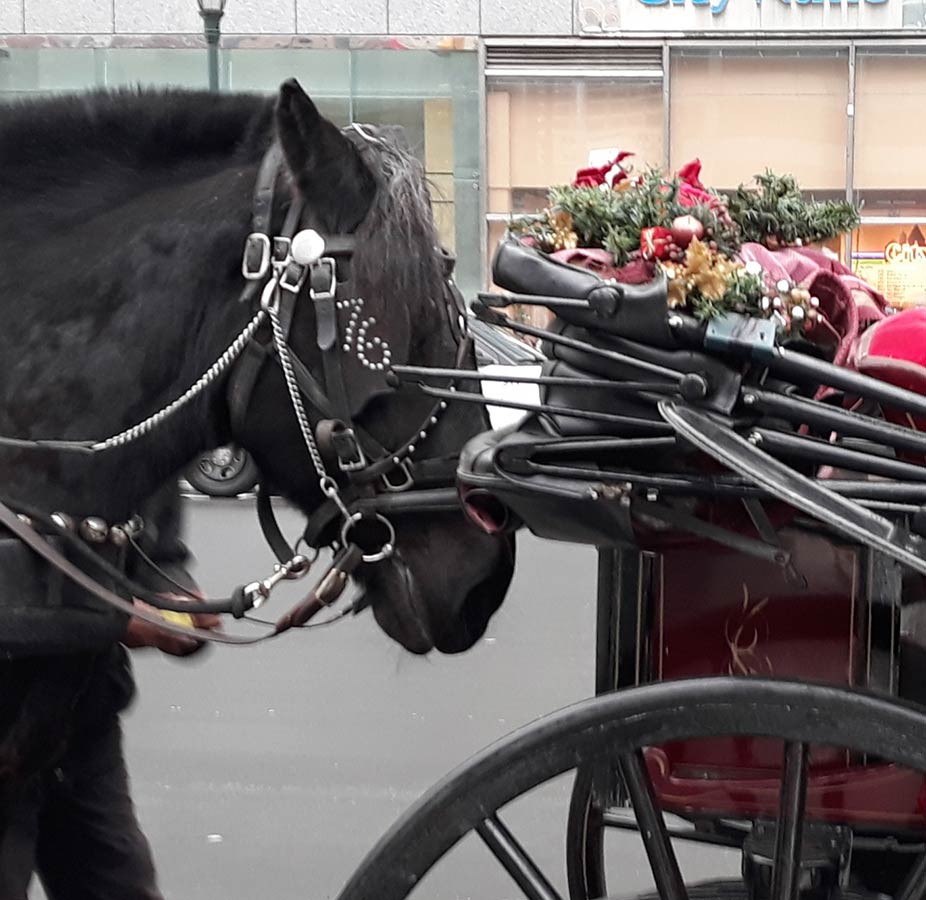 Photo credit Janet White
Photo credit Janet White
The fate of Philadelphia’s last carriage horse company may still be an open question, but the horses appear poised for eviction from their stables.
A developer has proposed a mixed-use building on the site of the 76 Carriage Company stables in the Olde Kensington neighborhood of Philadelphia.
According to Rising Real Estate, which first reported the proposal in March, a 6-story building with 110 residential units and commercial space is planned for 1640-48 N. Hancock, the site of the stable where the carriage horses are housed. A permit to demolish the stable was granted by the city to Harman Duetsch Corp. in June, according to city zoning board records.
Animal welfare advocates want to see an end to the carriage horse trade in Philadelphia. But they also are concerned about what will happen to the horses if the carriage company closes or is forced to move.
“What will happen to the horses?” asks Janet White, founder of Carriage Horse Freedom, whose members have been holding twice-monthly protests at Independence National Historic Park this summer.
Mike Slocum, president of 76 Carriage Co., which has operated carriage tours of Independence Park and other historic Philadelphia sites for 40 years, did not respond to an email or phone request for comment.
White said she and others are concerned about dangerous conditions the draft horses face on city streets and the health issues that arise from working in high temperatures and pounding the pavement every day, as well as being confined in an urban stable with only a small outside paddock area.
“Horse-drawn carriages are inhumane for the horses and dangerous for the public,” said White, adding that market research shows younger people are less interested in carriage rides. “As awareness of the problems associated with horse-drawn carriages is increasing, demand for horse carriage rides is decreasing.”
The 76 Carriage website says its horses are given “vacations” on farms in the country for several months a year.
But the Humane Society Veterinary Medical Association, which has 750 members in Pennsylvania, supports the carriage ban because of the dangerous health and safety conditions it addresses for the horses, as well as concerns for the safety of the general public.
“Horse-drawn carriages and motor vehicles should not share the same roadways, as doing so puts the animals and the public at risk,” said the association in a letter to the City Council president. “With their exhaust fumes, hard road surfaces, and busy traffic patterns, cities are simply not humane—as opposed to survivable—environments for carriage horses.”
The letter pointed specifically to concerns about stabling, handling and spooking, as well as health conditions related to the work such as laminitis and respiratory issues as reasons to ban the urban carriage trade. It also pointed to “sourcing” of the horses from Amish farms, which could mean they suffer from pre-existing conditions related to farm work.
White said city regulations governing working horses in extreme temperatures are not tough enough and put horses at risk for heat-related health issues, such as heat prostration.
“They can’t drive in 92 degrees or above, but they drive at 91 degrees and the pavement makes it hotter, she said.
The Animal Care and Control Team (ACCT), the entity that enforces city regulations regarding carriage horses, says it has not cited 76 Carriage for any heat violations this summer, a spokeswoman said.
The last serious carriage horse accident in Philadelphia occurred almost ten years ago. In 2012 a driver was seriously injured when her horse bolted, flipping the carriage in Center City. In 2010 a car hit a carriage near Independence Mall, touching off a chain reaction involving other two other carriages that injured five people and five horses.
76 Carriage Co. became the last carriage company in the city in 2017 after Philadelphia Carriage Company was shut down by the city over conditions in its stables.
The ten carriage horses owned by Philadelphia Carriage Company that were taken in by Gentle Giants Draft Horse Rescue and Rehabilitation have since been adopted and are living out their lives on farms, said Christine Hajek, president and founder of the group.
White said her group is pushing the City Council to follow the lead of Chicago, Salt Lake City and other cities around the world that have passed legislation to ban carriages. White recommends replacing the carriages with electric horseless carriages, or e-carriages, based on the designs of early automobiles.
White drafted legislation based on the Chicago ordinance that she presented to the City Council but has yet to find a sponsor. She said she has a petition with 27,000 signatures from members of the public supporting the ban.
Councilman Mark Squilla, who was instrumental in shutting down the Philadelphia Carriage Company, did not respond to a request for comment on a ban. WHYY radio reported he is looking into other cities that have implemented horseless carriages.
“Electric horseless carriages are a win-win solution to the problem of the inhumane and dangerous horse-drawn carriages,” White told WHYY. “There is no job loss. The carriage company will experience increased profits with the e-carriages” and Philadelphia will get good press by becoming the first U.S. city to transition to e-carriages.




